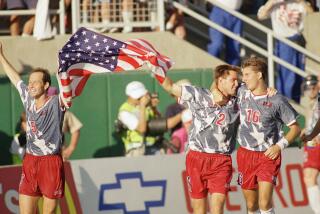Expanded World Cup Tops FIFA Agenda : Soccer: World governing body to focus on 1998 tournament, ’96 Olympics and planned professional league.
- Share via
NEW YORK — This is decision week for FIFA, and possibly for Major League Soccer, Alan Rothenberg’s touted but so far unrealized professional soccer league.
The leaders of FIFA, the sport’s international governing body, are in New York for three days of meetings.
Topping the agenda is deciding how to allocate eight more places for the 1998 World Cup in France.
Also scheduled is a briefing from Olympic officials on the soccer competition in the 1996 Games in Atlanta, when both men’s and women’s tournaments will be held.
In addition, there is the possibility that MLS will make the long-awaited announcement on its future: Will the league start next spring as promised or will it be postponed a year?
Then, too, a decision is expected on whether former Argentine star Diego Maradona is violating terms of his 15-month drug-related banishment from the sport by serving as an unpaid coach.
But France ’98 is the key matter.
For the first time since 1980, when the field for the 1982 World Cup in Spain was increased from 16 teams to 24, FIFA is having to grapple with demands from all six of its member confederations for extra places in the finals.
When FIFA President Joao Havelange of Brazil announced last year that the 1998 World Cup would be contested by 32 teams, it set off a flurry of backstage maneuvering and politicking that continues.
Europe, for example, has demanded 15 places, plus host France, an automatic qualifier. That would mean 16 European teams, or half the field. The argument is that Europe is where the best soccer is played, as evidenced by the fact that seven of the eight World Cup ’94 quarterfinalists were European.
Europe had 13 teams in World Cup ’94.
South America, too, is asking for greater representation. Having had four teams in USA ‘94, it wants five places in France ‘98, including Brazil, which qualifies automatically as the defending champion.
The South Americans also have suggested that each of the five major confederations (ignoring Oceania) be given one additional place, with the other three places being awarded to the first-, second- and third-place finishers in 1994--namely, Brazil, Italy and Sweden.
Africa and Asia, meanwhile, are demanding two additional berths each in the finals. Africa currently has three, Asia two.
Where does this leave FIFA?
On Wednesday, its World Cup Organizing Committee will meet here to decide what recommendation it will make to the Executive Committee. On Thursday, the Executive Committee will announce its decision.
Chances are, Europe will be given three additional places; Asia, Africa, South America and CONCACAF (the North and Central American and Caribbean region) will each get one, and the eighth will be up for grabs, possibly going to the winner of a playoff between teams from Asia and Oceania.
So far, the Olympic soccer tournaments have generated little controversy, FIFA and the International Olympic Committee--of which Havelange is a member--having earlier agreed that the 16 men’s teams each will be allowed to field three “over-age” players in what would otherwise be an under-23 tournament.
That opens the way for a limited number of World Cup stars to play, something the IOC wanted. In return, the IOC added women’s soccer as a medal sport. There are no age restrictions on the women’s teams and the defending world champion United States is the early gold-medal favorite.
In the case of Maradona, FIFA seems likely to turn a blind eye to his coaching duties at Deportivo Mandiyu, a modest Argentine team headed nowhere.
Under Argentine soccer federation rules, Maradona cannot become a professional coach until he completes a two-year coaching course. In the meantime, he is serving as an unpaid, albeit outspoken, “assistant” for Deportivo Mandiyu.
FIFA handed Maradona his second 15-month ban after he failed a postgame drug test during last summer’s World Cup.
As for MLS, Rothenberg, president of the U.S. Soccer Federation and head of the proposed new league, said an announcement could be made this week, possibly during the FIFA meetings.
MLS has been struggling to get off the ground, with investors showing only lukewarm interest. Its fate could hinge on a USSF Board of Directors meeting scheduled for Sunday in Los Angeles.
More to Read
Go beyond the scoreboard
Get the latest on L.A.'s teams in the daily Sports Report newsletter.
You may occasionally receive promotional content from the Los Angeles Times.







